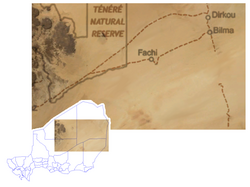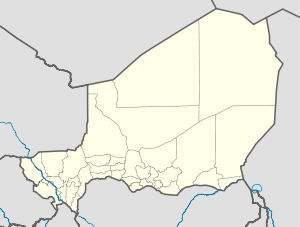Infrastructure tools to support an effective radiation oncology learning health system
Contents
Dirkou
Dirki | |
|---|---|
Commune | |
 | |
| Coordinates: 19°2′0″N 12°54′12″E / 19.03333°N 12.90333°E | |
| Country | |
| Region | Agadez Region |
| Department | Bilma Department |
| Commune | Dirkou |
| Elevation | 1,601 ft (487 m) |
| Population (2011) | |
• Total | 14,998 |
| Time zone | UTC+1 (WAT) |

Dirkou is a town in the Bilma Department, Agadez Region of north-eastern Niger. It lies in the northern Kaouar escarpment, a north–south line of cliffs which form an isolated oasis in the Sahara desert. As of 2011, the commune had a total population of 14,998 people.[1] Apart from the main city of Dirkou, the rural communities of Achénouma, Aney, and Emi Tchouma lie within the borders of the commune.[2]
The town is just south of Séguédine, and around 90 km north of Departmental capital Bilma. While isolated in modern Niger, it once lay on the important central soudan route of the Trans-Saharan trade which linked coastal Libya and the Fezzan to the Kanem–Bornu Empire near Lake Chad. Its population is made up primarily of traditionally sedentary Kanuri people, as well as semi-nomadic Tuareg and Toubou people.[3][4]
The Central Intelligence Agency operates an armed drone base near Dirkou, targeting Islamic State militants in southern Libya.[5]
Transport
The town is served by Dirkou Airport. It is on the route some migrants have taken from Niger to Libya.[6]
References
- ^ "Annuaires_Statistiques" (PDF). Institut National de la Statistique. Retrieved 2 May 2013.
- ^ "Dirkou · Niger". Dirkou · Niger. Retrieved 2021-12-17.
- ^ Decalo, Samuel (1997). Historical Dictionary of the Niger (3rd ed.). Boston & Folkestone: Scarecrow Press. ISBN 0-8108-3136-8.
- ^ Geels, Jolijn (2006). Niger. Chalfont St Peter, Bucks / Guilford, Connecticut: Bradt UK / Globe Pequot Press. ISBN 978-1-84162-152-4.
- ^ The New York Times (September 10, 2018). "How a C.I.A. Drone Base Grew in Niger's Desert". YouTube. Archived from the original on 2021-12-15.
- ^ "Over 40 people 'die of thirst' in Sahara Desert". BBC News. June 1, 2017. Retrieved June 3, 2017.


















